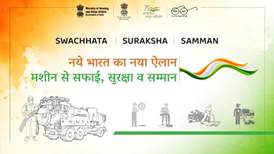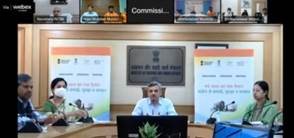Ministry of Social Justice & Empowerment
National Action for Mechanised Sanitation Ecosystem (NAMASTE)
Posted On:
17 AUG 2022 5:30PM by PIB Delhi
Namaste is a Central Sector Scheme of the Ministry of Social Justice and Empowerment (MoSJE) as a joint initiative of the MoSJE and the Ministry of Housing and Urban Affairs (MoHUA).
NAMASTE envisages safety and dignity of sanitation workers in urban India by creating an enabling ecosystem that recognizes sanitation workers as one of the key contributors in operations and maintenance of sanitation infrastructure thereby providing sustainable livelihood and enhancing their occupational safety through capacity building and improved access to safety gear and machines.

Ensure safety and dignity of sanitation workers in urban India and providing sustainable livelihood and enhancing their occupational safety through capacity building and improved access to safety gear and machines.
- NAMASTE would also aim at providing access to alternative livelihoods support and entitlements to reduce the vulnerabilities of sanitation workers and enable them to access self-employment and skilled wage employment opportunities and break the intergenerationality in sanitation work.
- In addition, NAMASTE would bring about a behavior change amongst citizens towards sanitation workers and enhance demand for safe sanitation services.
NAMASTE aims to achieve the following outcomes:
- Zero fatalities in sanitation work in India
- All sanitation work is performed by skilled workers
- No sanitation workers come in direct contact with human faecal matter
- Sanitation workers are collectivized into SHGs and are empowered to run sanitation enterprises
- All Sewer and Septic tank sanitation workers (SSWs) have access to alternative livelihoods
- Strengthened supervisory and monitoring systems at national, state and ULB levels to ensure enforcement and monitoring of safe sanitation work
- Increased awareness amongst sanitation services seekers (individuals and institutions) to seek services from registered and skilled sanitation workers
Five hundred cities (converging with AMRUT cities) will be taken up under this phase of NAMASTE. The list of cities will be notified at an appropriate time. The category of cities that will be eligible are given below:
- All Cities and Towns with a population of over one lakh with notified Municipalities, including Cantonment Boards (Civilian areas),
- All Capital Cities/Towns of States/ Union Territories (UTs), not covered in 4(i),
- Ten Cities from hill states, islands and tourist destinations (not more than one from each State).

Enumeration: NAMASTE envisages identifying the Sewer/Septic Tank Workers (SSWs) with a focus on informal workforce who are engaged in hazardous cleaning operations. The database will enable MoSJE, NSKFDC and MoHUA (including DAY-NULM, SBM 2.0 and AMRUT) to reach to the SSWs and their families and provide them necessary support for collectivization, skill building and linking with social and financial benefits. The Survey would be conducted by the City NAMASTE Managers and validated by the concerned ULB. The survey would be held in digital mode in a pre-approved format.
- Extending Insurance Scheme Benefits: For providing a safety net to identified SSWs and their families they will be covered under the Ayushyaman Bharat- Pradhan Mantri Jan Arogya Yojana (AB-PMJAY). The premium for AB-PMJAY for those identified SSWs families who are not covered earlier shall be borne under NAMASTE.
- Livelihood Assistance: The Action Plan will promote mechanization and enterprise development. NSKFDC will provide funding support and subsidy(capital +interest) to the sanitation workers, SHGs of SSWs and private sanitation service organizations (PSSOs) to procure sanitation related equipment and vehicles under SUY for total mechanization of cleaning operations. Identified SSWs and their dependants will be given counseling on available livelihood choices and an opportunity to acquire alternative skills, if they so desire. Depending on their personal preference, a SSW may choose to continue working in the sanitation sector, thereby becoming eligible for receiving capacity building training. Alternatively, the worker may choose to explore an alternative livelihood option or an entrepreneurial venture. In case the workers decide to adopt an alternate livelihood of their choice, skilling and EDP support will be provided to these workers. The workers may start a new livelihood project as an individual or as a group interested in same option. Details of rate of interest chargeable on self employment projects including sanitation related projects and the admissible capital subsidy are as follows:-
(a)The rate of interest chargeable from the beneficiaries will be as follows:-
|
Project cost
|
Rate of Interest per annum
|
|
Projects upto Rs. 100000 /-
|
5% (4% for women beneficiaries)
|
|
Projects above Rs 100000/-
|
6%
|
(b) Upfront Capital subsidy as under:
|
Range of Project Cost (Rs.)
|
Capital Subsidy
|
|
For individuals
|
|
Upto Rs. 5,00,000
|
50% of project cost
|
|
5,00,000 to 15,00,000
|
Rs. 2.50 lakh + 25% of remaining project cost
|
|
For Group Projects:
|
|
Upto Rs. 10,00,000 lakh per beneficiary with maximum project cost upto Rs. 50,00,000
|
Same as admissible to individuals subject to maximum Rs. 3.75 lakh per beneficiary.
|
(c) Interest Subvention:
Interest subvention for the rate of interest charged by the Bank over and above the rates of interest prescribed under the scheme, is also admissible. The maximum repayment period including the moratorium period of upto 6 months may be 5 years for projects costing upto Rs. 5.00 lakh and upto 7 years for projects costing above Rs. 5.00 lakh.
- Saturation with Social Security Schemes’ benefits: The identified sanitation workers and their family members will be extended benefits of all the social security schemes being implemented by various departments in the area, like:
- Food Security (Ration)
- Pradhan Mantri Awas Yojana
- Scholarship Schemes at pre matric and post matric level
- Enrolment of out of school, school-going-age children
- Atal Pension Yojana
- Pension Schemes for older persons, widows, orphan, physically challenged etc.
- Pradhan Mantri Suraksha Bima Yojana(PM-SBY)
- Pradhan Mantri Jeevan Jyoti Bima Yojana (PM-JJBY)
- Pradhan Mantri Ujjwala Yojana
- Allotment of free land/plots
- Anganwari
- Coaching for entrance exams and service.
- Any other scheme
- National NAMASTE Management Unit : National Safai Karamchari Financial Development Corporation(NSKFDC) would be implementing agency for NAMASTE. The Scheme will operate as a joint initiative of MOSJE and MoHUA, with a dedicated national team. At the apex of the structure will be the National NAMASTE Monitoring Unit (NNMU) under Managing Director, NSKFDC, which will report to concerned Division head in the MoSJE, Government of India. A Technical Support Unit (TSU) consisting of team of IT Professional, Experts of implementation of similar programmes, SHG expert, IEC expert, Banking expert etc., will be established in the NNMU to support the implementation of NAMASTE and facilitate coordination between MoSJE and MoHUA. Maximum monitoring and reporting will be on real time basis through mobile app and dedicated website.
- State Namaste Management Unit: The State Govt. will decide a suitable officer to be designated as State Namaste Director to head State Namaste Management Unit (SNMU). The officer may be from SBM, NULM, AMRUT or the ULB or any other relevant Department of the State. He will be assisted by PMU resource (State NAMASTE Manager) to be deployed under the Scheme as per requirement. At the City level, City NAMASTE Monitoring Unit (CNMU) shall consist of NAMASTE nodal officer of the city to be designated by the concerned ULB, who will be assisted by PMU resource (City NAMASTE Manager) deployed under the Scheme.
- City NAMASTE Monitoring Unit: While constituting the Project Management Unit as implementation body at the city level, the PMU would be organised in clusters of municipalities to work as City NAMASTE Monitoring Unit (CNMU) so as to coincide with the SBM clusters. PMU resources would be deputed by NSKFDC accordingly. The PMU should not duplicate the work of the PMU being constituted under the NULM. The work of the PMU should be passed on to the NULM for the purpose of forming SHGs and building strong livelihoods. City NAMASTE Monitoring Unit (CNMU) would also ensure to cover any other urban body like sewerage board/jal board, cantonment board etc. dealing with sewerage operations in the city. The details of indicative work profile of the City NAMASTE Manager is given at Annexure-II.
- Convergence of Programmes of MoSJE & MoHUA: The safety of SSWs is a joint responsibility of MoSJE and MoHUA. Hence, the intent of NAMASTE is to strengthen convergence amongst both Ministries for governance and implementation of the NAMASTE components. The Action Plan leverages the available financial allocations of existing SRMS, SBM, DAY-NULM and NSKFDC and brings in a focused approach to provide occupational, social and financial safety nets to the SSWs. The financing of the Action Plan shall be leveraged under the Schemes of MoHUA (SBM and DAY-NULM) particularly for the following interventions:-
- SHG formation of core sanitation workers
- PPE procurement and distribution
- Safety devices and equipment procurement (can also be financed through NSKFDC to ULBs)
- Occupational safety training and skilling for SEPs & Duty Supervisors (can also be done through NSKFDC under SRMS)
- Providing work assurance to sanitation workers interested in availing Sanitation Related Projects.
- Interventions under AMRUT
- IEC Campaign: Campaigns would be undertaken jointly by the ULBs & NSKFDC to spread awareness about the enumeration of target sanitation workers and other interventions of NAMASTE. Electronic and print media and hoardings at prominent locations shall be used for the campaign in local language and English/Hindi. Maximum use of social media during the publicity would be ensured.
The Scheme has been approved with an outlay of Rs. 360 crore for four years from 2022-23 to 2025-26.
********
MG/DP/RK
(Release ID: 1852627)